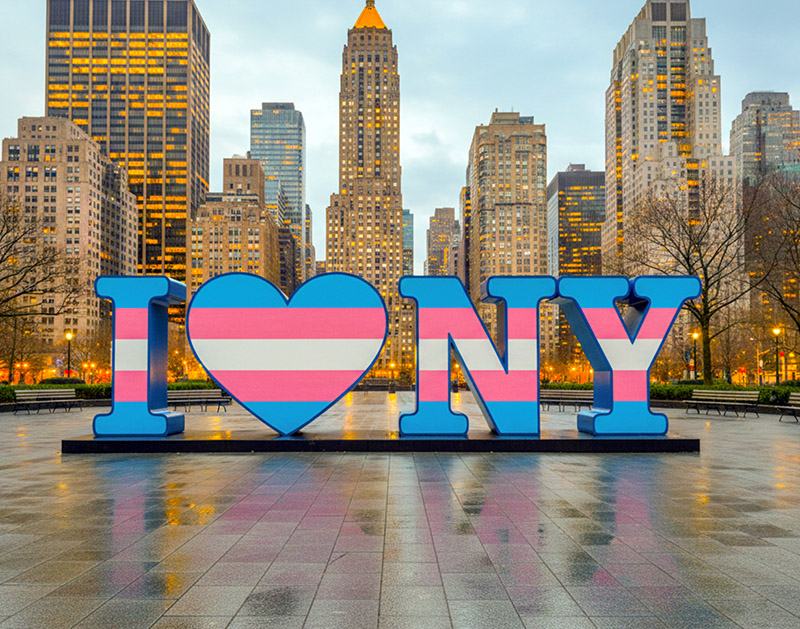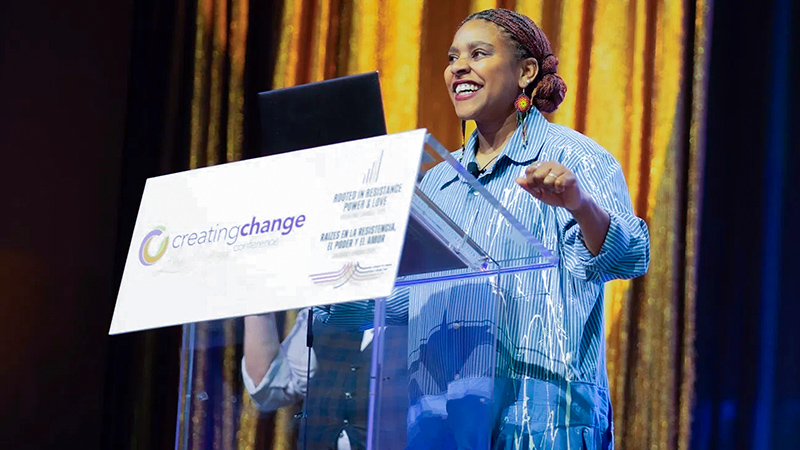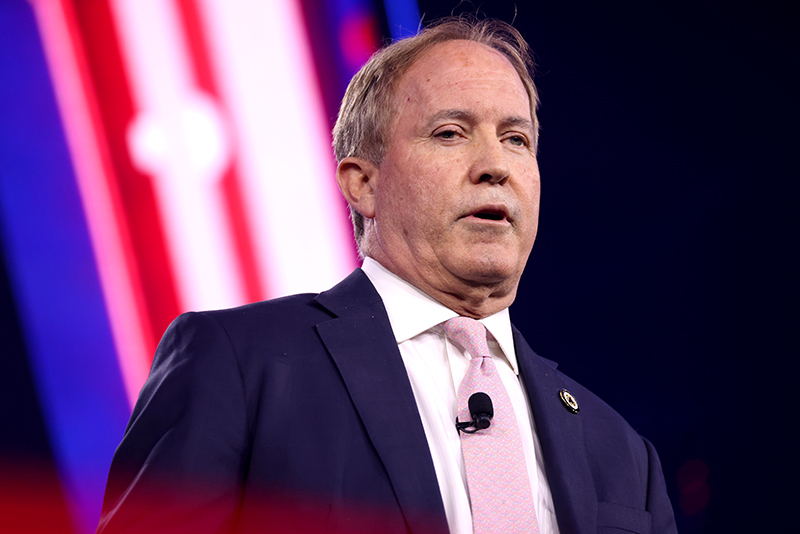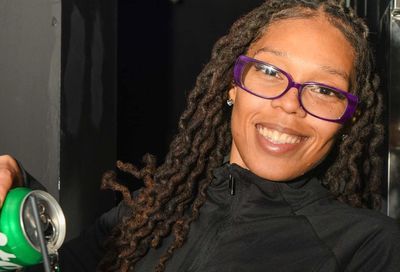Olympics Prepares to Ban Trans Women from Competition
The move follows an IOC review finding that athletes who underwent male puberty retain physical advantages over women.
By John Riley on November 11, 2025 @JRileyMW

The International Olympic Committee is reportedly preparing to ban transgender women from competing in all female-designated sports, according to a report by the U.K. newspaper The Times.
At present, each sport’s international federation sets its own rules on transgender eligibility, with some requiring athletes to undergo hormone therapy for a specific period before competing in the female category.
But IOC President Kirsty Coventry, elected earlier this year, has called for consistent standards across all sports. After taking office in June, she created four working groups to address key issues facing the IOC, including one focused on protecting women’s sports.
The change, which will reportedly be officially announced next year, was made after the IOC carried out a science-based review of the physical advantages of people assigned male at birth.
The Times reported that Dr. Jane Thornton, the IOC’s director of health, medicine, and science, briefed colleagues on the review’s findings. A former world rowing champion, Thornton said scientific evidence indicates that anyone who has undergone male puberty retains permanent physical advantages over females that cannot be fully offset by hormone treatment.
The report also concluded that athletes with Disorders of Sexual Development (DSD) — a group of conditions in which a person develops traits of both sexes — have measurable advantages over cisgender female athletes.
Former Olympic track star Caster Semenya — who recently withdrew her challenge to an international competition ban after refusing to take medication to lower her testosterone levels, despite a European Court of Human Rights ruling that she was discriminated against– is among several athletes with DSD.
An IOC spokesperson confirmed to The Athletic that Thornton spoke to members last week but said the working group is still discussing the issue and no final decisions have been made.
However, two senior IOC sources, speaking anonymously, told the outlet the ban on transgender athletes and those with DSD is almost certain to be imposed. Both described the change in eligibility rules as long overdue.
The participation of transgender and DSD athletes became a flashpoint during the 2024 Summer Olympics in Paris after two boxers — Imane Khelif of Algeria and Lin Yu-Ting of Taiwan — won gold medals despite having been disqualified from the 2023 World Championships for allegedly failing gender eligibility tests.
Both boxers were raised as and identify as women, and there is no evidence that either is transgender. However, they may have higher testosterone levels linked to DSD, a condition neither has been diagnosed with. Questions about their eligibility and perceived advantages over other competitors fueled renewed calls for a categorical ban on transgender athletes in women’s competitions.
It remains unclear whether the ban will take effect before the 2026 Winter Olympics in Milan and Cortina d’Ampezzo. The Times reported that the IOC could unveil the policy during its 145th Session in Milan, just days before the Games begin.
However, the ban is expected to be fully in place by the time Los Angeles hosts the 2028 Summer Olympics. Earlier this year, U.S. President Donald Trump signed an executive order barring transgender women from women’s sports and threatening to withhold federal funding from schools, universities, and states that refuse to comply.
As part of that order, Trump directed the State Department to review the visas of foreign athletes entering the United States to ensure they were not assigned male at birth. The department has since said it will impose permanent visa bans on any transgender individuals — not just athletes — whose gender marker on their application does not match their assigned sex at birth.
To date, only one openly transgender woman has competed in the Olympics: New Zealand weightlifter Laurel Hubbard, who qualified for the 2021 Tokyo Games but failed to complete a successful lift.
More from Metro Weekly:
Departing NYC Mayor Eric Adams Announces $2 Million for Trans Groups
New York City's outgoing mayor framed the grants as a response to federal threats targeting trans-serving organizations.
By John Riley on January 1, 2026 @JRileyMW
As one of his final acts in office, outgoing New York City Mayor Eric Adams announced plans to distribute $2 million in "emergency funding" to roughly 20 organizations serving transgender, gender-nonconforming, and nonbinary New Yorkers.
The grants are intended to counter federal budget cuts and Trump administration efforts to block LGBTQ organizations -- particularly those serving transgender people -- from receiving federal funding, reports Gay City News.
The funding, the first of its kind in the nation, will be administered by the New York City Department of Health and Mental Hygiene. The money is intended to support community organizations providing services to gender-diverse communities, including "health and wellness, legal advocacy, youth and family support, safety and crisis response, community building, and economic empowerment," according to the release.
National LGBTQ Task Force Brings Creating Change to D.C.
The Task Force returns its flagship national conference to Washington in January 2026 amid escalating attacks on LGBTQ rights nationwide.
By Will O'Bryan on December 14, 2025
A year ago, the National LGBTQ Task Force was girding to "hold the line," in a sense. Donald J. Trump had just won the presidential election with a plurality -- 49.8% -- of the popular vote, setting the stage for a January inauguration that would install an administration expected to be oppressively hostile to the country's LGBTQ community, particularly the Transgender community, as well as efforts promoting diversity, equity, and inclusion.
The sweeping scope of that hostility, from discharging all Trans service members from the U.S. military to the pettiness of erasing rainbow crosswalks, transpired at breakneck speed.
Texas Launches “Tip Line” to Target Trans Restroom Use
Texas AG Ken Paxton’s tip line encourages people to report and photograph transgender people accused of using the "wrong" restroom.
By John Riley on December 20, 2025 @JRileyMW
Texas Republican Attorney General Ken Paxton has launched a "tip line" urging residents to report to state authorities people they believe are transgender for using restrooms that do not align with their sex assigned at birth -- a violation of Texas’ bathroom ban.
In a statement announcing the tip line on his office’s website, Paxton said the bathroom ban -- known as the "Texas Women's Privacy Act" -- is intended to protect women and girls from "mentally ill men wanting to violate their basic right to privacy" in restrooms, locker rooms, and other changing facilities.
Support Metro Weekly’s Journalism
These are challenging times for news organizations. And yet it’s crucial we stay active and provide vital resources and information to both our local readers and the world. So won’t you please take a moment and consider supporting Metro Weekly with a membership? For as little as $5 a month, you can help ensure Metro Weekly magazine and MetroWeekly.com remain free, viable resources as we provide the best, most diverse, culturally-resonant LGBTQ coverage in both the D.C. region and around the world. Memberships come with exclusive perks and discounts, your own personal digital delivery of each week’s magazine (and an archive), access to our Member's Lounge when it launches this fall, and exclusive members-only items like Metro Weekly Membership Mugs and Tote Bags! Check out all our membership levels here and please join us today!
The Magazine
-
Most Popular
 5 Takeaways from New Survey on LGBTQ Life Under Trump
5 Takeaways from New Survey on LGBTQ Life Under Trump  Matt Rogers, Bowen Yang Apologize for Dismissing Jasmine Crockett
Matt Rogers, Bowen Yang Apologize for Dismissing Jasmine Crockett  Dallas Approves Rainbow Steps at Pro-LGBTQ Church
Dallas Approves Rainbow Steps at Pro-LGBTQ Church  28 Years Later: The Bone Temple Is Brutal and Bleak
28 Years Later: The Bone Temple Is Brutal and Bleak  Anti-Gay Tirade Caught on Video in Alexandria Supermarket
Anti-Gay Tirade Caught on Video in Alexandria Supermarket  What Trump’s Return Has Cost LGBTQ Lives in D.C.
What Trump’s Return Has Cost LGBTQ Lives in D.C.  10 Guilty of Cyberbullying Brigitte Macron Over Trans Rumors
10 Guilty of Cyberbullying Brigitte Macron Over Trans Rumors  Texas A&M Bars Plato, Professor Teaches Censorship Instead
Texas A&M Bars Plato, Professor Teaches Censorship Instead  How Well Do You Know the Hanky Code?
How Well Do You Know the Hanky Code?  Douglas Sills Finds Himself in Tevye
Douglas Sills Finds Himself in Tevye
 Dallas Approves Rainbow Steps at Pro-LGBTQ Church
Dallas Approves Rainbow Steps at Pro-LGBTQ Church  Matt Rogers, Bowen Yang Apologize for Dismissing Jasmine Crockett
Matt Rogers, Bowen Yang Apologize for Dismissing Jasmine Crockett  Douglas Sills Finds Himself in Tevye
Douglas Sills Finds Himself in Tevye  What Trump’s Return Has Cost LGBTQ Lives in D.C.
What Trump’s Return Has Cost LGBTQ Lives in D.C.  5 Takeaways from New Survey on LGBTQ Life Under Trump
5 Takeaways from New Survey on LGBTQ Life Under Trump  28 Years Later: The Bone Temple Is Brutal and Bleak
28 Years Later: The Bone Temple Is Brutal and Bleak  Texas A&M Bars Plato, Professor Teaches Censorship Instead
Texas A&M Bars Plato, Professor Teaches Censorship Instead  MacKenzie Scott Donates $45 Million to The Trevor Project
MacKenzie Scott Donates $45 Million to The Trevor Project  Supreme Court Signals It May Uphold Transgender Sports Bans
Supreme Court Signals It May Uphold Transgender Sports Bans  Ruby Corado Sentenced to 33 Months in Prison for Wire Fraud
Ruby Corado Sentenced to 33 Months in Prison for Wire Fraud
Scene
Metro Weekly
Washington's LGBTQ Magazine
P.O. Box 11559
Washington, DC 20008 (202) 527-9624
About Us pageFollow Us:
· Facebook
· Twitter
· Flipboard
· YouTube
· Instagram
· RSS News | RSS SceneArchives
Copyright ©2025 Jansi LLC.















You must be logged in to post a comment.